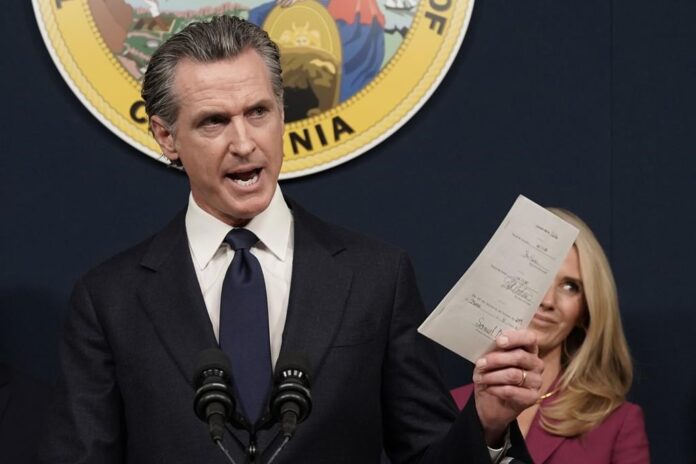While Gov. Gavin Newsom has pledged to make California a sanctuary for women seeking abortions, his administration won’t spend public money to help people from other states travel to California for the procedure.
Newsom’s decision, included in a budget agreement reached over the weekend, surprised abortion advocates who have been working with the governor for nearly a year to prepare for a potential surge of patients from other states coming to California for abortions now that the U.S. Supreme Court has overturned Roe v. Wade.
California’s operating budget, which is scheduled for a vote in the state Legislature on Wednesday, includes $20 million for an “Abortion Practical Support Fund” to pay for things like airfare, lodging, gas and meals for people seeking abortions in California. But the money can only be used to help people who already live in California, not people traveling from other states. The fund will accept private donations, but it’s unclear if that money can cover out-of-state travel expenses.
A spokesperson from Newsom’s office said the governor chose to focus on strengthening and expanding California’s existing abortion services. During a news conference on Friday, Newsom noted the budget contains tens of millions of dollars to support the state’s abortion clinics _ funding he said could free up their budgets so they could use their own money to help women travel to California.
“We’re being realistic. You’re going to ask, `Are we going to pay for everyone’s travel and accommodations for 33 million people, of which 10% may seek care in California?’ Come on. We have to be realistic about what we can absorb,” Newsom said. “It’s not just the government providing and supporting. It’s all of us. It’s you, it’s me, it’s everyone contributing.”
Trending Stories
What causes long COVID? Canadian researchers think they’ve found a key clue
Ghislaine Maxwell sentenced to 20 years in Jeffrey Epstein sex abuse case
California’s budget includes $40 million to cover abortions for women who can’t afford them, including women from other states who travel to California. But Jessica Pinckney, executive director of Access Reproductive Justice, a California nonprofit that helps women pay for the logistics of an abortion, said travel is often one of the biggest barriers women face in seeking reproductive care.
“Including out-of-state travel is absolutely necessary to reduce the barriers and burdens to those who are coming from hostile states,” she said.
‘It’s going to get worse really fast’: Abortion about to be banned in Tennessee
Travel within California is important too, she said, because 40% of the state’s 58 counties don’t have abortion clinics, accounting for 3% of California’s female population. Many of them are low-income.
“There certainly is a benefit to having in-state travel financial support for Californians,” she said. “But the out-of-state piece really gets at the folks who are being impacted by the fall of Roe.”
While the state Legislature will likely approve the state budget on Wednesday, lawmakers can still make changes to it later. The current budget proposal allows the Abortion Practical Support Fund to also accept private donations. Democratic state Sen. Nancy Skinner’s office said they would try to clarify that at least the private money could be used to cover out-of-state travel expenses.
But Pinckney said she and other advocates will ask lawmakers for an amendment to let the public money also cover out-of-state travel expenses.
Pinckney’s nonprofit, Access Reproductive Justice, normally raises between $3,000 and $8,000 per month. Pinckney said they’ve raised about $100,000 in the five days since the Supreme Court ruling.
Still, they helped about 500 people last year. So far this year, their numbers have doubled each month compared to last year. Pinckney said she wouldn’t be surprised if they end up helping 2,000 people or more.
“We need public funding in order to encourage private funders to contribute,” she said.
© 2022 The Canadian Press



